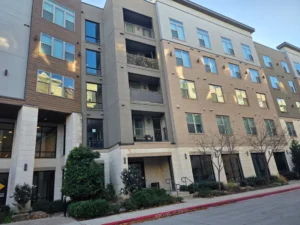Many residents learned how to fake utility bills and paystubs.

Atlanta Landlords Beating Back Renter Fraud With Faster Evictions And AI Screening
A year ago, Atlanta was the nexus of a new wave of rental fraud, with national landlords singling out the area as an especially challenging place to collect rents, even in upscale buildings.
But property managers say they have gotten a handle on the issue with the help of artificial intelligence software and an easing of the court backlog in handling eviction cases.
“Delinquencies are coming down, and I think a lot of it has to do with, as an industry, we’ve gotten a lot better in Atlanta about figuring out fraud and getting on top of it,” Portman Residential Senior Vice President Sean Henry said during Bisnow’s multifamily event on Thursday. “I’ve seen a significant … drop off in delinquencies.”
Coming out of the pandemic, landlords reported an uptick in tenants staying in luxury apartments for months, even more than a year, without paying rent. Many residents learned tactics, such as how to fake utility bills and paystubs, to get approved for a rental on social media platforms like X, formerly Twitter, and TikTok, Bisnow previously reported.
Delays in the Atlanta Magistrate Court following the lift of eviction moratoriums stretched for more than a year. Before the cases finally got resolved, landlords said, renters would pack up and move out in the middle of the night, often perpetrating the same scam at a different property.
“Around the country, Atlanta was the poster child for this fraud issue and people being able to live in apartments for two years without paying,” TruAmerica Multifamily co-Chief Investment Officer Matt Ferrari said at the event.
The apartment owners at the event said the courts have been processing evictions quicker, which has helped the issue. But they have also implemented new screening tools that weed out potential fraudsters.
AI-based software, staff training and resources that can detect faked documents have addressed delinquency issues for Mid-America Apartment Communities in the past year, Executive Vice President Tim Argo said during a Feb. 6 earnings call.
Screen Your Tenant Today!
Gain peace of mind with AAOA’s credit, criminal, and eviction reports.
“Being very preventative has been helpful,” Argo said. “It probably hurt occupancy for a while there in Atlanta, but it’s going to be better long term, and we started to see that play out with continued lower bad debt.”
Mesa Capital Partners President Paul Berry said at one point roughly 25% of the apartments at a 282-unit building were delinquent, but the rate has been brought down to around 6% through evictions.
“The good news is we can take a unit that hasn’t paid rent in a year and we can convert it to a lease,” Berry said. “There’s great software out there that does a very nice job on the screening side. We use those across the board to make sure that we’re not repeating the problems of the past.”
Atlanta’s magistrate court processed more than 11,800 evictions last year, The Atlanta Journal-Constitution reported. Berry told Bisnow after his appearance on a panel that some evictions are being processed in as little as four months in the city, whereas two years ago it might have taken as long as 18 months.
Atlanta Chief Magistrate Judge Cassandra Kirk in December requested more funding for the court to hire additional staff to combat the continued backlog and resolve cases within a year of filing, according to the AJC.
A court official didn’t respond to Bisnow‘s request for comment.
The Radco Cos. Executive Vice President Keanan Gomez said the firm’s third-party management arm centralized its property operations, including screening of potential tenants, ushering eviction cases through the court system and working with live-in police officers to help push out delinquent tenants.
Efforts over the past 18 months on Radco managed properties tamped delinquencies down from up to 15% down to 4% within 12 months, Gomez said.
“Our industry has really done a good job of adapting to software,” he said. “When you take your eye off the tool, you let people in the door.”
Ferrari said his firm upped the security deposit amounts at some of its properties from $200 to $1,000 to dissuade would-be fraudsters.
“If my security deposit is $1,000 and all my neighbors are $200, where’s the one with the fake driver’s license and all the fraud going to go? They’re not going to show up to my building with $1,000,” he said.
As more apartment operators turn to AI tools, they are seeing savings on their bottom lines, RangeWater Managing Director Virginia Lancaster said. RangeWater, like many operators with large portfolios, is relying on AI to assist in apartment leasing and maintenance requests, cutting down the number of after-hour service requests.
RangeWater is also one of the many landlords using AI to handle collections from tenants who have fallen behind on their rents. More than 1 million units use EliseAI for unpaid rent collections, Bisnow reported last year.
“On the collections front, I think this was really impactful, because our teams don’t like to manage delinquency,” Lancaster said. “They know it’s confrontational.”
Source: Bisnow













 Accessibility
Accessibility